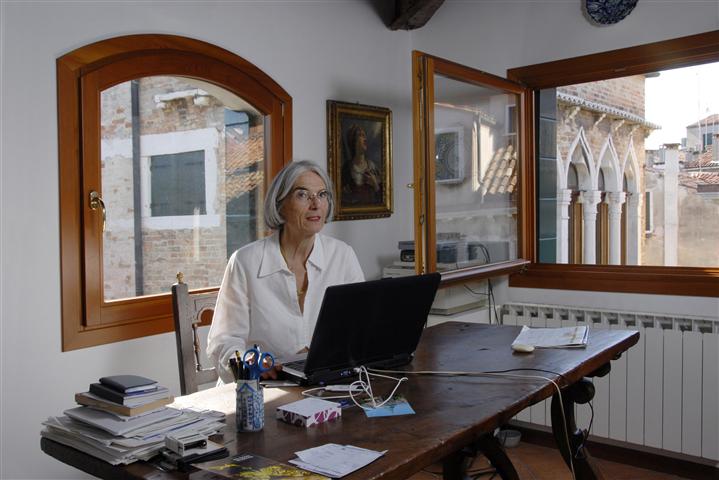
You
have been quoted as saying that the seed for your Commissario Guido Brunetti
Mystery series was planted backstage at the La Fenice Opera House during a
discussion of ways to do away with a particularly irksome conductor. Do you
feel that moment was more than opportune, perhaps kismet, considering what it
produced?
I think it was just dumb luck, a fair bit of which I've had
in my life. Gabriele Ferro and his wife are Sicilians, so when we started to talk
about another conductor of whom none of us had much good to say or think, there
followed what the Italians call "un
escalation," and I found myself studying the room for a place to put
the body, and from that to method, and from that to motive. Hmmm, the books
haven't changed much in two decades, have they? I'd never thought about writing
a book, but once the idea came, I figured I'd give it a pop and see what
happened.
Guido
Brunetti, the main character in the series, is a sophisticated humanist who happens
to have a job that brings him into daily contact with crime, corruption and
less-than-admirable people. How did you come to create Brunetti? Did you know
that he was so complex and humane from the start, a person who would continue
to surprise you?
When I wrote the book, I thought only of a one-off: I wanted
to see if I could write a book; the idea of a series never appeared. I did have
the sense, however, to write about a man I'd like to have dinner with--not a
drink, mind you; that's too quickly over--but a meal, during which he could
talk about what he was reading, what he thought about the current situation in
Italy and the world, where he might venture an opinion about Holy Mother
Church. Experience suggests to me that a life lived in intimate company with a
beloved person is a happier life, so he, like Mr. Bingley, was in need of a
wife. She, too, had to be someone who would be able to opine about this and
that, so I made her a professor of English literature. It could have been
Italian, I suppose, but I find it easier to show off in English. The three of
us have been engaged in conversation since that evening.
Guidebooks
for tourists tend to focus on significant historical aspects (and objects) of
Venice; while honoring Venice's past, you look at how your characters reside in
a contemporary city alive at every turn, although some of those turns may be
well over 800 years old. How do you avoid the temptation to exploit the
touristy aspects of the city you obviously love?
I've lived there long enough to have days or
afternoons--especially if I'm in a hurry--when I take the city for granted.
Fancy that, huh? Boring old Basilica. Not another
bridge! This feeling comes upon many of us who live there; luckily, it is
easily dissipated by the sight of a window or a trellis or a stone never seen
before. I suppose it's like living with a gorgeous man: you've seen him in the
morning, grumpy, so you come to take him for granted. But if he puts on the tux
(and Venice always wears a tux) the sight of him can knock you down.
Each
mystery Brunetti investigates centers on an issue in Venetian life--Drawing Conclusions, for example,
touches on the issue of long-term residents of advancing years, and
particularly available elder care. Is there an element of serendipity at work
here as you land on a particular issue for a new novel in the series?
Yes, I've found many of the subjects of the books in the
newspapers or a casual remark someone makes, even sometimes overheard remarks.
Old animosities are wonderful because you get stories that can go back
generations and are exposed to rancor that has had that much time to ripen. I
never know when it is going to hit, but I always know when it does.
Many
readers are particularly taken with Signorina Elettra, secretary to
Vice-Questore Giuseppe Patta, who proves a perfect accomplice for Brunetti and
serves as a window into different perspectives for him. How do you get into the
personalities of so many distinct characters? Self-hypnosis? A trance state?
Adapting real-life models freely?
I think it's called imagination.
You
pride yourself on living anonymously in Venice and have gone so far as not to
allow the Guido Brunetti mysteries to be translated into Italian to reduce the
possibility of becoming famous or even recognized in Italy. Police tend to know
their citizenry (and the historical city of Venice has only 50,000 permanent
residents); do you think the Venice police force may be aware of you and have
interest in you, despite your efforts to remain anonymous?
I'm sure the police have absolutely no interest in me. Italians
don't read much, and certainly most of them don't read in a foreign language,
so anything they think they know about me comes to them from gossip or
references in the papers. But it's rather as if you were to be told that a
famous Icelandic writer lived on the next block. Big deal. Also, everything
that's been said in the books is common knowledge.
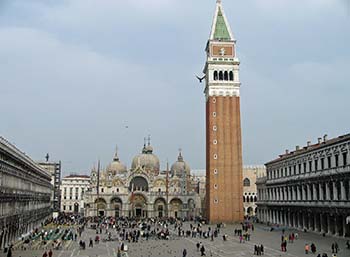 You
have lived year-round in Venice for decades. What are the particular pleasures
of living there that compensate for any drawbacks of being in a city that can
become overrun by tourists?
You
have lived year-round in Venice for decades. What are the particular pleasures
of living there that compensate for any drawbacks of being in a city that can
become overrun by tourists?
Everything the eye falls upon is beautiful, there are no cars, and
people are always willing to stop and chat. Fresh vegetables and fish are
available at the Rialto market, people look good, and life is slow and
relaxing. But the most important part is the beauty, I think.
Our
culture finds ingenious ways to commercialize the most unlikely things. Venice,
as a unique wonder and repository of history, offers a multitude of
opportunities for beloved sites and objects to be converted into kitschy
artifacts for sale. Have you run into any particular ones that take your breath
away?
Plastic gondolas? With fairy lights? Jesters' hats? Ceramic
ashtrays with a photo of the Rialto Bridge? That dreadful water-swirled paper?
The made-in-China masks and glass? Pizza sold by the slice? McDonald's?
Open-air stands selling tourist crap? The politics of the city?
In
Venice, you never have to be concerned about taking care of car trouble. For a
writer, that is one less distraction from getting down to serious writing. Are
there other benefits for the writing discipline that you have found by living
there?
I look out my window and I see the Bell Tower of San Marco.
That will suffice.--John McFarland
Author photo: Regine Mosimann







 You
have lived year-round in Venice for decades. What are the particular pleasures
of living there that compensate for any drawbacks of being in a city that can
become overrun by tourists?
You
have lived year-round in Venice for decades. What are the particular pleasures
of living there that compensate for any drawbacks of being in a city that can
become overrun by tourists?
%20Eugenia%20Levenson.jpeg) Jamison
Stoltz is a senior editor at Grove/Atlantic. He edits nonfiction--recent
titles include Harlem: The Four Hundred
Year History from Dutch Village to Capital of Black America by Jonathan
Gill and Mint Condition: How Baseball
Cards Became an American Obsession by Dave Jamieson--and mysteries and
thrillers, including Mike Lawson's Joe DeMarco series and the novels of Mark
Haskell Smith. Before joining Grove/Atlantic, he worked at William Morris in
London and New York.
Jamison
Stoltz is a senior editor at Grove/Atlantic. He edits nonfiction--recent
titles include Harlem: The Four Hundred
Year History from Dutch Village to Capital of Black America by Jonathan
Gill and Mint Condition: How Baseball
Cards Became an American Obsession by Dave Jamieson--and mysteries and
thrillers, including Mike Lawson's Joe DeMarco series and the novels of Mark
Haskell Smith. Before joining Grove/Atlantic, he worked at William Morris in
London and New York.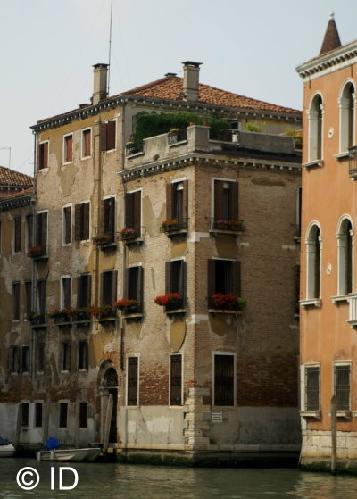 Are there any
specific challenges for you in editing the books, other than controlling your
urge to make frequent trips to Venice to fact check details of the locale?
Are there any
specific challenges for you in editing the books, other than controlling your
urge to make frequent trips to Venice to fact check details of the locale?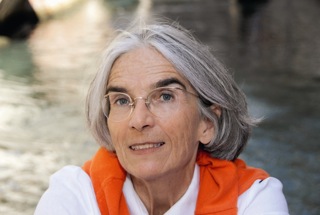
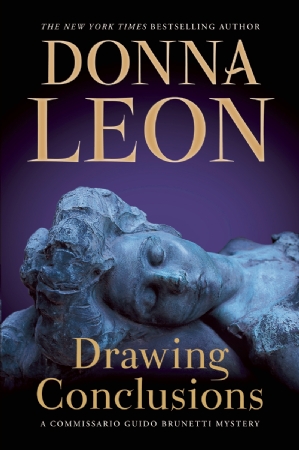 Drawing Conclusions is the 20th Commissario Guido Brunetti novel by Donna Leon, and it will absolutely delight longtime fans and new readers alike. Her writing is so pleasurable--both graceful and provocative--that those coming to her for the first time are to be envied, with 20 books to sink into.
Drawing Conclusions is the 20th Commissario Guido Brunetti novel by Donna Leon, and it will absolutely delight longtime fans and new readers alike. Her writing is so pleasurable--both graceful and provocative--that those coming to her for the first time are to be envied, with 20 books to sink into.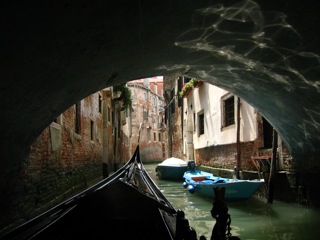 The Commissario considers the scene at the woman's apartment; while he thinks of himself as "the least superstitious of men and took pride in his intense respect for reason and good sense," he accepts the possibility of something that leaves traces, and here he senses traces of a troubled death. But the pathologist says that Costanza Altavilla died of a heart attack, and the bruise on her neck--well, perhaps when she fell....
The Commissario considers the scene at the woman's apartment; while he thinks of himself as "the least superstitious of men and took pride in his intense respect for reason and good sense," he accepts the possibility of something that leaves traces, and here he senses traces of a troubled death. But the pathologist says that Costanza Altavilla died of a heart attack, and the bruise on her neck--well, perhaps when she fell....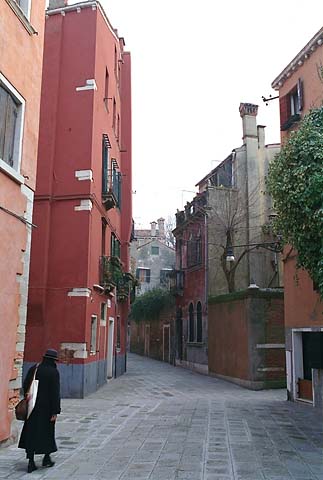 The mystery is compelling, as twisted as Venetian streets, and further joys in Drawing Conclusions come from Brunetti and his circle of family and police, and the particular world that is Venice.
The mystery is compelling, as twisted as Venetian streets, and further joys in Drawing Conclusions come from Brunetti and his circle of family and police, and the particular world that is Venice.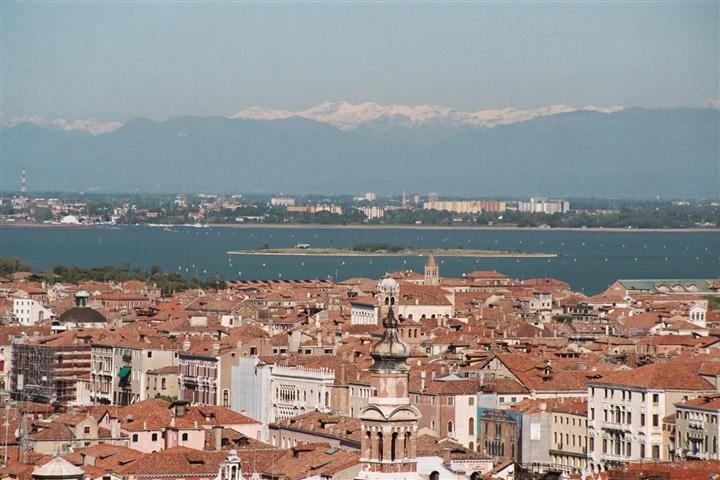 Guido Brunetti is the heart of these novels--philosophical, skeptical, slightly melancholy, an adoring husband and father, cheered by the beauty of Venice but aware of the abandonment and decay, the slow decline of the city he loves. "After a time, he went out into the kitchen, grumbling at the day, and found a note from Paola. 'Stop grumbling. Coffee on stove. Just light it. Fresh brioche on counter.' " He looks out the back window to the Dolomites in the north; though he is from many generations of Venetians, he finds solace in the mountains. They seem "so very permanent, while the sea, ever changing, was to him visibly disturbed by what happened to it, further, it was a more evident victim of the damage and depredations of man."
Guido Brunetti is the heart of these novels--philosophical, skeptical, slightly melancholy, an adoring husband and father, cheered by the beauty of Venice but aware of the abandonment and decay, the slow decline of the city he loves. "After a time, he went out into the kitchen, grumbling at the day, and found a note from Paola. 'Stop grumbling. Coffee on stove. Just light it. Fresh brioche on counter.' " He looks out the back window to the Dolomites in the north; though he is from many generations of Venetians, he finds solace in the mountains. They seem "so very permanent, while the sea, ever changing, was to him visibly disturbed by what happened to it, further, it was a more evident victim of the damage and depredations of man."